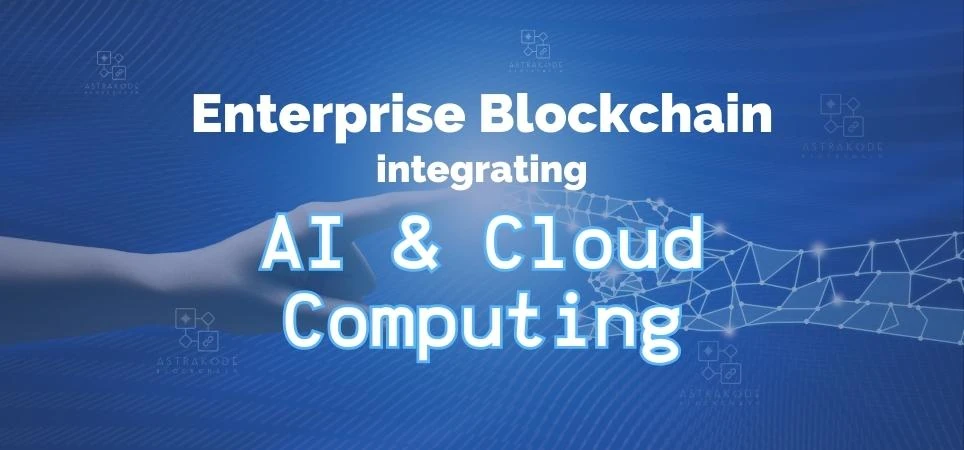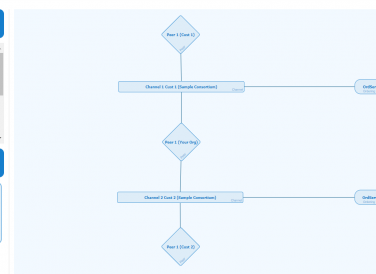Blockchain leads in transparency and security with its real-time ledger system that tracks and validates transactions. This robust framework significantly reduces the risk of fraudulent activities. Pairing this with AI, we can delve deeper into data analysis, identifying patterns, trends, or anomalies that might signify potential threats, thereby reinforcing the security quotient.
Further enhancing the robustness of this combination is cloud computing. Providing a scalable, secure, and flexible infrastructure, it facilitates efficient data storage and processing capabilities. The integration of blockchain within the cloud realm can potentially deliver a powerful, secure solution capable of handling voluminous data and intricate computational tasks, while ensuring data integrity and accessibility.
Blockchain and Emerging Tech Integration
Blockchain, with its secure, decentralized, and transparent nature, holds enormous potential for integration with various emerging technologies. Here, we’ll explore a few noteworthy ones:
- Internet of Things (IoT): Blockchain and IoT integration is already underway and making waves across industries. The combination of these two technologies is solving common IoT challenges like security, scalability, and interoperability. Blockchain allows IoT devices to share data securely, reducing system risks and the need for intermediaries. This shines in supply chain traceability, where IoT records real-time data and blockchain tracks the product journey.
- Artificial Intelligence (AI): Blockchain can add transparency to the often opaque world of AI, enabling traceability of decisions made by AI algorithms. This combination could also provide a secure environment for data sharing, essential for machine learning models. AI can, in turn, improve the efficiency of blockchain operations by optimizing tasks such as network maintenance or transaction validation.
- Cloud Computing: Blockchain could augment cloud computing with enhanced security and data privacy. For instance, it can create a decentralized cloud where data is distributed across the network, reducing the risk of data breaches. Blockchain can also bring transparency to usage-based billing models in cloud services.
- 5G Networks: Blockchain can enhance the security of 5G networks by managing and protecting the massive number of data points these networks will have. It can also play a role in network slicing, where a network is divided into multiple unique, virtual networks that can be used for different purposes.
- Augmented Reality (AR) and Virtual Reality (VR): Blockchain can help create decentralized platforms for AR/VR content, facilitating copyright protection and reducing content duplication. Furthermore, blockchain could be used to manage and verify the virtual assets used in these realities.
For this specific blog we delve into the exciting potential of integrating blockchain technology with AI and cloud computing. Let’s explore the possibilities and paint a picture of the future landscape of these powerful technologies working together.
Blockchain, AI, and Cloud computing: A Unified Approach
AI and blockchain merge for process automation, offering significant time and resource savings. These technologies automate repetitive tasks, increasing speed and reducing human error. When paired with cloud computing, the benefits are amplified, providing scalable, adaptable solutions for changing business needs.
Furthermore, the integration of blockchain, AI, and cloud computing paves the way for improved and personalized customer experiences. Blockchain, with its ability to secure and make transparent supply chains, coupled with AI’s capacity to curate personalized recommendations based on customer behavior and preferences, can create customer experience that is both secure and highly tailored.
The integration of blockchain with AI and cloud computing can bring a paradigm shift that’s set to redefine the future of digital technology.
Here’s a glimpse into the future implications of these emerging integrations:
- Increased Trust and Accountability in AI: Blockchain can bring transparency to AI’s black box problem by recording the decision-making process on a distributed ledger. This would foster trust among users and regulators by providing a clear audit trail for AI’s decision-making process.
- Data Marketplaces: With blockchain’s ability to secure data transactions and AI’s ability to process and analyze large volumes of data, we could see the rise of decentralized data marketplaces. These platforms would allow individuals and organizations to buy and sell data securely and transparently.
- Decentralized Cloud Storage: Blockchain can facilitate decentralized cloud storage solutions, offering more security and data privacy. This would not only make data breaches extremely difficult but also give users control over their data.
- Efficient Resource Utilization: Blockchain and AI can optimize resource utilization in cloud computing environments. AI can predict demand and resource allocation, while blockchain streamlines transactions, improving computational resource sharing.
- Enhanced Security: AI’s predictive abilities, blockchain’s tamper-proof ledger, and cloud computing’s scalability can forge robust cybersecurity solutions.
- Innovation in Various Sectors: Industries like healthcare, finance, and supply chain will keep innovating with these tech integrations, driving efficiency, transparency, and user empowerment.
The integration of blockchain, AI, and cloud computing will reshape the future of digital technology. This convergence drives efficiency, cost savings, and personalized customer experiences. With automation and scalability, businesses can adapt quickly to changing demands.
Let’s delve into a few real-world use cases that underscore the transformative potential of these technologies when united:
- Financial Industry: A hotbed for digital innovation, the financial industry stands to benefit immensely from the confluence of these technologies. Blockchain, with its inherent transparency and security, can pave the way for secure payment systems, reducing fraud and enhancing trust. AI algorithms can scour through this blockchain data to pinpoint suspicious transactions, enabling a proactive response to potential fraud. Simultaneously, cloud computing comes into play by providing a secure, scalable environment for storing and processing this data, making real-time analytics a possibility and thereby ensuring prompt action when anomalies are detected.
- Healthcare Industry: The healthcare sector is another domain ripe for transformation. The amalgamation of blockchain, AI, and cloud computing can revolutionize how health services are delivered. Blockchain could serve as a secure vault for sensitive patient data, ensuring confidentiality and integrity. AI uses the data to offer personalized healthcare suggestions, tailoring treatments to individual health profiles. Cloud computing offers secure data storage and efficient processing globally, improving the feasibility and efficiency of remote healthcare.
- Retail Industry: In the retail industry, the convergence of blockchain, AI, and cloud computing is opening new avenues for secure, customer-centric operations. Blockchain can render supply chains transparent, enabling customers to trace the origin and journey of their products, instilling a new level of trust. AI can tailor recommendations based on customer behavior and preferences, enhancing the shopping experience. Cloud computing further bolsters this by offering a platform for storing and processing customer data, making it accessible anytime, anywhere.
- Supply Chain Transparency: Blockchain’s transparency and traceability can cut fraud by logging an unalterable record of transactions and goods movements. Meanwhile, AI can optimize inventory levels and reduce downtime through predictive analytics for demand forecasting and real-time quality control. Cloud computing enables scalable storage and processing, and integrates seamlessly across different systems. The tech trio could forge a transparent, efficient supply chain, improving operations, cutting costs, enhancing quality, and boosting customer service.
Blockchain, known for its transparency and security, has impacted various sectors by revolutionizing traditional operations. When synergistically combined with AI and cloud computing, its potential is amplified even further. This powerful convergence of technologies is not only streamlining processes but is also redefining industry standards. As we move forward, the integration of these advanced technologies will continue to drive innovation, delivering increasingly efficient, secure, and impactful solutions.
Achieving a successful integration of blockchain, AI, and cloud computing will require strategic planning and deliberate execution as we seen blockchain’s integration with different technologies. Organizations should consider the following best practices to ensure the most effective and efficient implementation:
- Prioritize Security and Interoperability: The integration of these technologies should not compromise on security. Organizations need to choose AI systems and blockchain platforms that can seamlessly integrate and collaborate. Moreover, partnering with cloud computing providers who uphold rigorous security protocols and have reliable data storage systems is paramount.
- Invest in Scalable Infrastructure: Anticipating future growth and increasing demands is crucial. Organizations should partner with cloud computing providers that can effortlessly scale their services to match their growth trajectory. Investing in high-quality, scalable hardware and software that can accommodate the demands of these advanced technologies is also advisable.
- Foster Continuous Learning: Technologies like AI, blockchain, and cloud computing are continually evolving, which necessitates a constant learning approach. Organizations should invest in regular training and skill development for their workforce. Upskilling existing staff and hiring new talent with the requisite expertise can help in harnessing the full potential of these technologies.
- Adopt a Phased Approach: The integration process should be iterative and staged rather than an abrupt, one-off effort. Starting with smaller, manageable projects can provide invaluable insights for larger-scale implementations. This approach can also help manage risks better and facilitate smoother transitions.
- Embrace Collaboration: Combining blockchain, AI, and cloud computing can be a complex undertaking that may require expertise from different domains. It’s beneficial to collaborate with expert partners or form multidisciplinary teams within the organization to ensure the successful execution of integration projects.
Conclusion: Navigating the Confluence of Blockchain, AI, and Cloud Computing
In the ever-evolving landscape of technology, the enterprise blockchain integrating AI & cloud computing presents unprecedented opportunities. Their convergence is not only reshaping industries but also paving the way for innovative solutions to complex challenges. As we’ve seen, this triad has the potential to boost efficiency, enhance security, foster transparency, and deliver improved user experiences.
However, harnessing the power of these technologies requires foresight, robust infrastructure, and a commitment to continuous learning. The adoption and successful integration of these technologies must be approached strategically, with a clear understanding of their potential and limitations.
As the digital transformation continues to unfold, Astrakode Blockchain (AKB) remains committed to enabling businesses to capitalize on this convergence. With our low code approach and visual environment, AKB enables you to create smart contract (Hyperledger Fabric, solidity) and network composer (Hyperledger Fabric). Our platform makes it easier for businesses to navigate the complexities of emerging technologies and leverage their benefits. By creating a world where these powerful technologies work together, we’re contributing to an exciting future, one that promises greater transparency, efficiency, and innovation.
Interested in diving deeper into the diverse applications of blockchain technology? Visit our Use Cases page.




